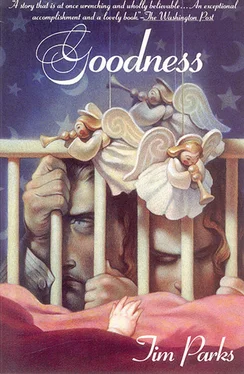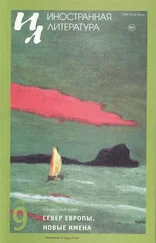Tim Parks - Goodness
Здесь есть возможность читать онлайн «Tim Parks - Goodness» весь текст электронной книги совершенно бесплатно (целиком полную версию без сокращений). В некоторых случаях можно слушать аудио, скачать через торрент в формате fb2 и присутствует краткое содержание. Год выпуска: 1994, Издательство: Grove Press, Жанр: Современная проза, на английском языке. Описание произведения, (предисловие) а так же отзывы посетителей доступны на портале библиотеки ЛибКат.
- Название:Goodness
- Автор:
- Издательство:Grove Press
- Жанр:
- Год:1994
- ISBN:нет данных
- Рейтинг книги:3 / 5. Голосов: 1
-
Избранное:Добавить в избранное
- Отзывы:
-
Ваша оценка:
- 60
- 1
- 2
- 3
- 4
- 5
Goodness: краткое содержание, описание и аннотация
Предлагаем к чтению аннотацию, описание, краткое содержание или предисловие (зависит от того, что написал сам автор книги «Goodness»). Если вы не нашли необходимую информацию о книге — напишите в комментариях, мы постараемся отыскать её.
, to get his life back on the rails again.
Goodness — читать онлайн бесплатно полную книгу (весь текст) целиком
Ниже представлен текст книги, разбитый по страницам. Система сохранения места последней прочитанной страницы, позволяет с удобством читать онлайн бесплатно книгу «Goodness», без необходимости каждый раз заново искать на чём Вы остановились. Поставьте закладку, и сможете в любой момент перейти на страницу, на которой закончили чтение.
Интервал:
Закладка:
Tim Parks
Goodness
Prologue
My father was a missionary murdered in Burundi in 1956. It was very much his own fault. He had been warned to leave and by not doing so he risked getting the rest of us killed too. When we were captured in our white mission bungalow, my mother, my sister and I were given the choice of dying with him or of saying some simple formula that renounced our faith, after which we would be allowed to leave the country. I was too young of course either to have a faith or to renounce it, though I don’t doubt what my decision would have been. My mother on the other hand was torn. She’s a superstitious woman and believes in the power of words spoken even when not meant, the kind of person who would feel guilty at discovering that the phrase she had innocently repeated in some foreign language was blasphemy. Even today she wonders if she won’t be punished for all eternity for having responded to her maternal instinct and saved both herself and us.
It’s curious thinking about this now. Presumably a shot rang out and dispatched my father. I don’t remember, I was too small. I haven’t the slightest memory either of him or of Africa. If I think of his martyrdom at all it is with total incomprehension. And if I mention the grotesque affair now it is only because over the years I have come to see it as just the first, the most absurdly emblematic, of a long series of incidents in which other people’s pretensions to goodness were to clash, to my considerable detriment, with the most naked common sense.
Part One. BEFORE HILARY
A Bundle of Unpleasant Contradictions
After my father’s death we came back to England to live with my widowed grandfather and spinster aunt in an ill-conceived semi-detached in Park Royal, about mid way between the Middlesex Hospital and where they later built the A40. My grandfather, who had escaped his country labourer background with a naval career that pulled him up to the dizzy heights of home ownership, lace curtains, embossed wallpaper and the like, was of the opinion that he was doing us a great favour putting a roof over our heads, and having never been able to stomach my fervently evangelical father, adopted a told-you-so attitude that was to weigh heavily on my sister Peggy and myself throughout our childhood, and even more so, one imagines, on my mother who had no money to go elsewhere.
‘Those jungle boys,’ the old man would begin, though I don’t suppose he could have been much over fifty then, ‘haven’t got souls to save, have they?’ He smoked a pipe, as grandfathers will, or used to, and regularly occupied a heavy shapeless armchair in an ungenerous living room choked with green Wedgewood and Hummels. ‘Never saw the point of missionarying,’ he grunted.
I remember, from where I would be lying on the hearthrug, being fascinated by his facial skin, especially on the cheeks where the pores were so thick and large as to suggest the texture of some old neglected sponge. Certainly they had soaked up enough in their time. His hair was already white and prickly short, the kind old men scratch vigorously. ‘Shifty sods too.’ He sucked in through his nose. ‘Saw enough of that lot in my time to know to leave well alone, I did.’
Naturally he was speaking, even in those early days, over the urgent clamour of the television which he watched fixedly but didn’t appear to need to listen to. Unless it was encroaching deafness. He puffed one pipe while scraping the bowl of another. ‘If Arthur’d had any sense at all he’d have kept a gun in the house. Couple of loud bangs would have had that lot scarpering. That’s what I say.’
My mother only said. ‘Please, Dad. Please,’ and would get up and go into the kitchen. He might shout after her: ‘For God’s sake, Jenny, can’t you even take a joke? Or are you going to mourn after him your whole bloody life?’ She wouldn’t answer. She would never answer. This is my mother’s way. For my own part, I remember feeling desperately sorry for her, yet incapable of intervening, since I always suspected that Grandfather, incorrigibly unpleasant and offensive as he was, was right. What was the point of missionarying? What possible sense did it make? My father must have been mad to go out there talking to blacks with their bones in their noses, their drums, their funny clothes, when they wore them (we had photographs). It wasn’t that I was of an age to hold any progressive beliefs on the equal value of all cultures and religions. Quite the contrary. Just that somehow, from the cradle, I didn’t believe in the saving and transformation of souls. My intuition has always been that people are who they are and forever remain so, or at best will simply become more and more themselves, more and more that spirit that you can’t help but feel destined to be. Just as it is destiny to be black, destiny to be white. This is what self means, surely. Otherwise who are we?
Only Peggy objected. Only she stood up for Father. She said: ‘You shouldn’t say those kinds of things, Grandad.’ We sat, lay, stood in that smoky suburban sitting room in West London: floral carpet, a pattern of coronation crowns and sceptres on the wallpaper, the grey TV carelessly wrapping and rewrapping time into odd half hours of this and that. Peggy said: ‘Black people have souls just like us. Yes they do. Red and yellow, black and white, all are precious in His sight.’
What would she have been, seven, nine? She wore her hair in a ponytail and stood chubbily round-bottomed by Grandfather’s chair. She said: ‘Daddy was a good man. He loved the Lord Jesus and he wanted to save people so they wouldn’t go to hell. And now he has gone to heaven to wait for us there.’
While she spoke of course, my Grandfather would keep mumbling and rumbling his prejudices, since this wasn’t really a conversation so much as two people at either end of life speaking their parts in each other’s presence. ‘Man would’ve done better if he’d thought of his own wife and kids before those bloody chimpanzees.’
I might catch the sound of my mother crying softly in the kitchen.
‘God is looking after us,’ Peggy insisted.
‘With the help of muggins here’s pension I suppose,’ Grandfather came back. Until eventually he turned from the television to look at her out of sunken brown eyes. Though there was still a glint there. He would have been wearing his pub-going dark waistcoat, shirt-sleeves rolled up; a bulky, heavy-breathing presence.
Staring him out, she said: ‘Don’t be such a miserable old grumbler, Grandad. It’s sinful to grumble and be miserable.’
The sight of her, rather than anything she said, would at last make him forget his racist grouching. He’d say, ‘Come here, Peggy love. Come and sit on Grandad’s knee.’
She pouted. She might well have had her hands on her hips. Probably she was already aware of striking poses. Certainly Grandfather recognised them when they were struck. He liked to grab her and cuddle her hard on his knee and say things like: ‘My jewel, my Peggy. I do like a little girlie with some sparkle about her.’
My mother cooked, Grandfather rowed with or cuddled Peggy, and around six thirty Aunt Mavis came back, flopped down in an armchair, kicked off her shoes, treating us to a whiff of feet which nobody commented on, and lit a cigarette. I even remember the brand, Park Drive. They were the first I tried myself, stealing from her handbag. With her and Grandad together and the windows forever closed against ‘the damp’, we thus sat out the 1960s in a thick Virginia smog.
Very quietly, to myself and Peggy, when she had us on our own walking to church perhaps, my mother would say: ‘Smoking is evil. Because it’s an abuse of the body the Lord gave you.’ It was the nearest she came to criticising Grandfather openly. She said: ‘Our bodies are precious, holy. Every human body, His temple, made in His image. That’s why you must never smoke. You must promise me you’ll never smoke.’ I suppose one might have objected that martyrdom was an even greater abuse of this image of God’s we were supposed to be taking care of. But as a boy this never occurred and later there would seem no point in being cruel, since, come eighteen odd, you have learnt to humour rather than rebel. You have already won your freedom. Or at least you’re of an age to think in such terms.
Читать дальшеИнтервал:
Закладка:
Похожие книги на «Goodness»
Представляем Вашему вниманию похожие книги на «Goodness» списком для выбора. Мы отобрали схожую по названию и смыслу литературу в надежде предоставить читателям больше вариантов отыскать новые, интересные, ещё непрочитанные произведения.
Обсуждение, отзывы о книге «Goodness» и просто собственные мнения читателей. Оставьте ваши комментарии, напишите, что Вы думаете о произведении, его смысле или главных героях. Укажите что конкретно понравилось, а что нет, и почему Вы так считаете.












